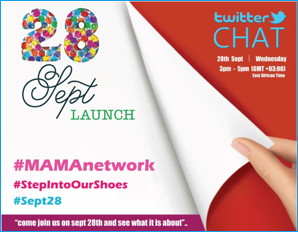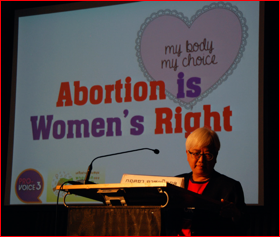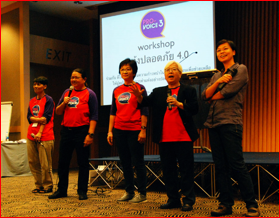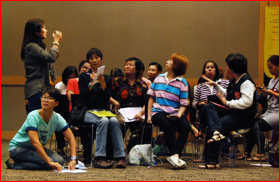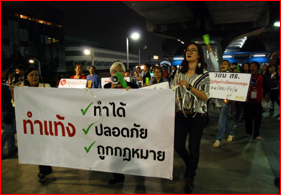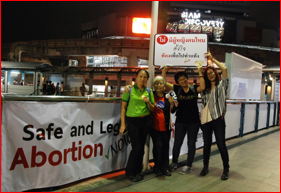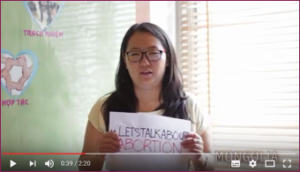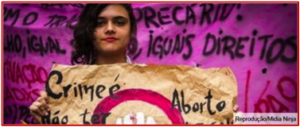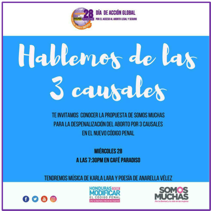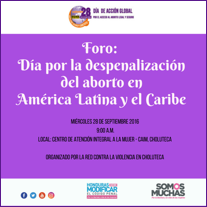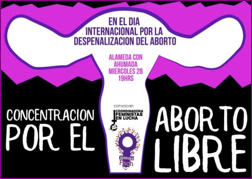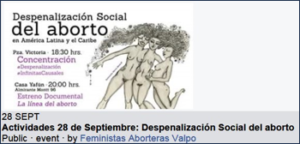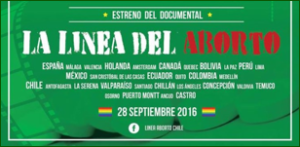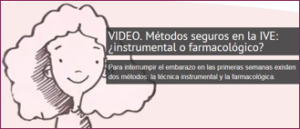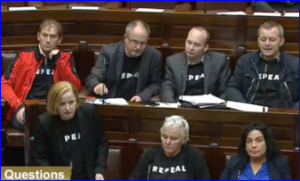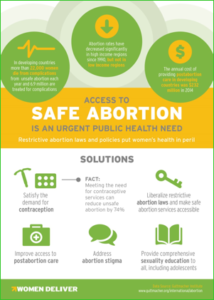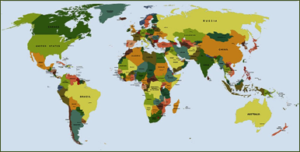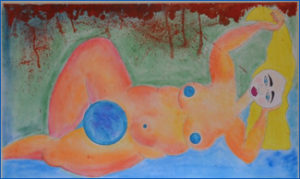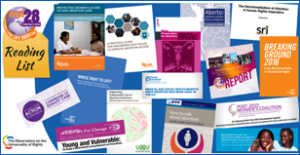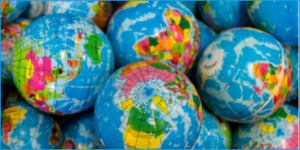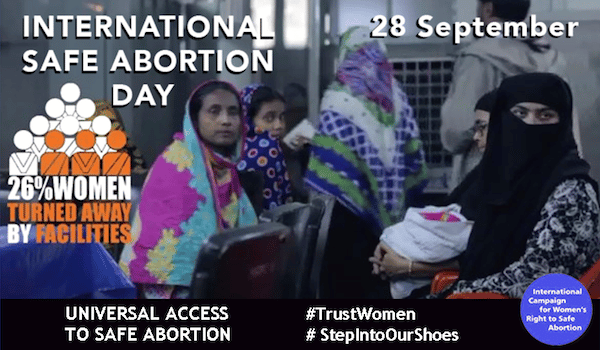
28 September 2016
UN OHCHR HUMAN RIGHTS EXPERTS: REVISED/TRANSLATED STATEMENT
“Unsafe abortion is still killing tens of thousands women around the world” – UN rights experts warn
“El aborto inseguro sigue matando a decenas de miles de mujeres en todo el mundo”, advierten expertos de la ONU
« L’avortement à risques tue toujours des dizaines de milliers de femmes à travers le monde », avertissent les experts des droits de l’ONU
******************
AFRICA
Statement by the Special Rapporteur on the Rights of Women in Africa
On this day, September 28, the global day of action for access to safe and legal abortion, and in line with our continental Campaign for the Decriminalization of Abortion in Africa, the African Commission on Human and People’s Rights through the Special Rapporteur on the Rights of Women in Africa, Justice Lucy Asuagbor calls for States to honor their commitments under the African Charter on Human and People’s Rights and the Protocol to the African Charter on Human and People’s Rights on the Rights of Women in Africa; the Maputo Plan of Action; and the Campaign for the Accelerated Reduction of Maternal Mortality in Africa – by decriminalizing abortion in their respective countries.
According to the World Health Organization (WHO), unsafe abortion continues to be a public health crisis and one of the largest contributors of maternal mortality and morbidity in Africa, accounting for up to 30% of maternal deaths in many sub-Saharan countries. The WHO estimates that over 6 million unsafe abortions occur in Africa, resulting in 29,000 deaths and countless serious injuries and disabilities every year for African women and girls under the age 25.
We agree with the WHO that making abortion illegal does not reduce abortion rates and neither does it deter women from having abortions. Instead, more women are pushed to the backstreet where they access unsafe abortions. It is time to bring a stop to these deaths.
Criminal laws on abortion are discriminatorily enforced and disproportionately impact the most vulnerable women and girls. Those who are poor, rural and lack education are at the highest risk of police investigations, arrest, prosecution, and imprisonment for unsafe abortions. Furthermore, women who fear prosecution for unsafe abortions often delay or fail to seek treatment at public hospitals or clinics, with adverse effects to their health and lives.
Criminalizing abortion violates many basic human rights, including the right to: life, liberty, security, health, and freedom from torture. Criminal abortion laws discriminate on the basis of sex—they penalize a health service only women need.
It is for these reasons that we join the global movement for a world where all women and girls can be empowered to make their own choices about their reproductive health and lives.
http://www.achpr.org/news/2016/09/d238/
***
KENYA
Trust for Indigenous Culture and Health (TICAH)
September 28 MAMA Network Launch Announcement: TICAH in Partnership with Women Help Women and other partners in sub-Saharan Africa are launching a network of safe abortion hotlines as we mark September 28.
******************
ASIA
THAILAND
Choice Network: Activities reported in this morning’s newsletter in pictures
***
ASIA SAFE ABORTION PARTNERSHIP YOUTH CHAMPIONS
Let’s Talk About Abortion – we are sharing this video created by ASAP Youth Champions for Sept 28th. The video highlights the stigma and barriers to abortion access in Asia and underscores the need to have more positive conversations around abortion.
******************
LATIN AMERICA
BRAZIL
VIRADA FEMINISTA – a 24 hour programme of talks by a huge range of people, mostly from Brazil but also from Nicaragua and Uruguay, including artists, philosophers, health professionals, activists, legal experts, and many more, every half hour or hour round the clock, see: #PrecisamosFalarSobreAborto24h
In Portuguese, see: http://www.brasilpost.com.br/2016/09/22/aborto-virada-feminista-e_n_12126046.html?1474549563
***
HONDURAS
Somos Muchas
The Somos Muchas collective, a group of about 20 NGOs working to have abortion under exceptional circumstances decriminalised in Honduras’ new penal code, has several events on 28 September:
– A gathering at the Café Paradiso where we will talk about the proposal of Somos Muchas for the decriminalisation of abortion on three grounds in the new Penal Code. We’ll also have music and the poetry of Karla Lara and Anarella Vélez Osejo.
– In Tegucigalpa, we are participating in a protest outside the national Congress
– In Choluteca (the south), another member of Somos Muchas is hosting a forum on the decriminalisation of abortion in Latin America and the Caribbean.
***
CHILE
A number of feminist groups are organising actions in several Chilean cities for free and safe abortion.
In Santiago, la Sesegen FECH and Feministas en Lucha are organising a demonstration from 7pm today, and in Valparaiso there is a march from 6:30 pm local time. For action in Temuco you can find information on Facebook. The hashtags are: #DerechoADecidir #YoDecido #28Septiembre.
Additionally the documentary “Linea aborto Chile” (Chilean abortion hotline) will be shown for the first time in different cities. For example, the documentary will be shown in Iquique this evening local time: The documentary is about the seven-year history of the hotline and its accomplishments. The hotline was initiated in 2009 by the group Lesbianas y Feministas por el Derecho a la Información en Chile and has answered more than 20,000 calls from women asking for information about abortion.
******************
EUROPE
SPAIN
Asociación de Clínicas Acreditadas para la IVE (ACAI)
On the occasion of International Safe Abortion Day, ACAI (the Association of Accredited Abortion Clinics) calls on the Spanish health authorities to maintain the quality of the health care delivery of induced abortion in Spain, as well as the freedom of choice of abortion method for women, whether surgical or medical. As established in the laws governing health care and abortion: “All women that have indicated their intention to undergo a voluntary termination of pregnancy will receive information on the different methods for termination of pregnancy…”. In accordance with the legislation, the law requires that:
- v Prior to a voluntary termination of pregnancy the informed consent of the woman must be obtained.
- v Prior to the signing of informed consent, the women is told about the various abortion methods available.
- v It is the woman who decides which method she wants to use.
You can see our video explaining these issues to women.
***
IRELAND
Irish Parliament 27 September
Abortion is not a black-and-white issue, prime minister Enda Kenny has said as the issue of repealing the 8th amendment to the Constitution was raised in the Dáil (parliament) in the wake of the demonstration in Dublin at the weekend. Mr Kenny referred to the wearing of sweatshirts by the six members of Anti-Austerity Alliance-People Before Profit with the message “Repeal” during Leaders’ Questions. Member of Parliament Ruth Coppinger said 165,000 women had had to travel out of the State for an abortion in the prime minister’s 41 years in the Dáil. She asked him to accept “the Constitution is not the place to decide these issues and ultimately the church and the State have to stay out of personal decisions”. Mr Kenny said he had listened to many tragic stories and that was why it was appropriate for the Citizens’ Assembly to tease out the issues. “It is in everybody’s interest that there be a sensitive, rational and comprehensive discussion about this,” he said. The assembly will hold its first meeting on October 15th. Irish Times, 27-09-16
******************
NORTH AMERICA
USA
Catholics for Choice
To mark International Safe Abortion Day, Catholics for Choice joins civil society organizations and nonprofits worldwide in calling for the repeal of all laws criminalizing abortion care. We believe in a world where everyone has equal access to the full range of reproductive healthcare services—including access to safe and legal abortion. Around the globe and here in the United States there is still more work to be done.
In the US, an onslaught of anti-choice laws has made the right to an abortion something that, for many women, exists merely on paper and not in reality. We believe the voices of pro-choice Catholics belong at the center of the efforts to advocate for access to abortion. Our Abortion In Good Faith campaign tells the stories of Catholics across the country who want accessible reproductive health care choices for everyone – no matter how much money they have, where they live or what they believe.
- Our campaign features the voices of everyday Catholics – a state legislator, a former nun, a graduate student, a cancer researcher, and a business owner – who want public funding of abortion.
- A majority of Catholic voters believe that insurance should cover abortions when a woman decides it is appropriate.
- Catholics are called by our faith to show solidarity with and compassion for the poor. This tradition is what compels us to speak out against abortion restrictions like the Hyde Amendment, because they disproportionately affect the reproductive, economic and social well-being of low income women and women of color.
***
USA
RESURJ
In commemoration of the Global Day of Action for Access to Safe Abortion, this month RESURJ is releasing a special edition of its monthly roundup, Reflections on Our Countries. In this special edition, RESURJ members, allies and friends in the different regions are sharing their reflections on the state of abortion in their countries. In several countries in Africa, we read about the colonial roots of the restrictive abortion laws, which are still being applied today, and ongoing battles of feminists and activists to introduce even minor amendments to these outdated texts. This is also true in some countries in Asia, a problem that is compounded by a conservative socio-cultural context, lack of quality health care services and inequality in accessing these services. Also, in countries of the Pacific Islands and Latin America, despite the existence of laws permitting abortion on a limited number of grounds, abortion services remain inaccessible to many women, especially young and low income women, and often times very burdensome. Advocacy efforts in Latin American countries to liberalize these laws are also met at times with resistance from the growing conservative forces in the various countries.
***
USA
Women Deliver
An excellent infographic from Women Deliver, with help from the Guttmacher Institute.
***
USA
Guttmacher Institute
An op-ed for 28 September by Ann M Starrs, President of the Guttmacher Institute, was published on the Guttmacher website, entitled “Abortion in Developing Regions: What Progress Since 1990?” It opens by saying: Abortion is common. Globally, an estimated 56 million abortions took place each year between 2010 and 2014, which translates to one in four pregnancies ending in abortion. It was originally published by Rewire.
It then provides valuable abortion statistics published by Guttmacher, which everyone writing about abortion should know about and use I their own work!.
***
USA
Youth Coalition for Sexual and Reproductive Rights
To mark 28 September, the Youth Coalition for Sexual and Reproductive Rights is proud to launch our Young People Choose: International Safe Abortion Day Watchdog. We’re very proud to share with you this a unique piece of artivism that features the voices of young people from around the world as they speak out for the right to safe and legal abortion.
***
CANADA
Association for Women’s Rights in Development (AWID)
On behalf of the working group of the Observatory on the Universality of Rights, sharing with you a collection of 15 resources for activism for safe and legal abortion.
***
USA
Ipas
Destigmatizing and Decriminalizing Abortion: That’s Our Collective Work
“Why in the 21st century do we still need a day of action? Who are abortions safe and legal for in today’s world, and who defines what is “safe” and what is “legal”? Ipas’s director of community access Leila Hessini comments on how we must destigmatize, decriminalize, and democratize abortion – in the United States and worldwide. You can read the full version here on Rewire





